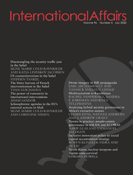-
Views
-
Cite
Cite
Herman T Salton, Sovereignty and the new executive authority: ethics, national security, and the rule of law, International Affairs, Volume 96, Issue 4, July 2020, Pages 1094–1096, https://doi.org/10.1093/ia/iiaa112
Close - Share Icon Share
Extract
‘[The sovereign] has to be just and yet also a man. This is therefore the most difficult of all tasks, and a perfect solution is impossible. Nothing straight can be constructed from such warped wood as that which man is made of’ (p. 67). So wrote Kant, in conveying the difficulty of restraining what he called the ‘supreme authority’, be it a person or a group. Two centuries later, Isaiah Berlin agreed by famously titling one of his collections of essays The crooked timber of humanity. The aim of this important, timely and highly readable edited volume is to explain why political leaders are both friends and enemies of sovereignty, and why restraining them is so critical but also so difficult.
The contributors do so by tracing the intellectual roots of ‘sovereignty’ and by highlighting its continuing relevance domestically (what they call ‘vertical sovereignty’), as well as internationally (or ‘horizontal sovereignty’). In both contexts, the concept is foundational, though as I note below, curiously so. At the domestic level, every political regime is defined by the scope and limits of sovereignty, whereas at the international level, post-Westphalian sovereignty is so entrenched that one would be forgiven for mistaking it for a time-immemorial principle of international politics. From ‘Brexit Britain’ to Crimea, from Palestine to China, from ‘America First’ to European nationalism, to the Scottish, Kurdish and Catalan independence movements, the concept of sovereignty has historical and legal significance, but also explosive political implications. The merit of this volume is to highlight both the promises and the perils of the idea of sovereignty, and to note that ethics and the rule of law (including international law) remain the best hopes for limiting the worst excesses of what Hannah Arendt referred to as ‘the human condition’.





